Kia Stonic vs VW T-Roc - Differences and prices compared
Compare performance (115 HP vs 150 HP), boot space and price (20100 £ vs 26400 £ ) at a glance. Find out which car is the better choice for you – Kia Stonic or VW T-Roc?
Costs and Efficiency:
Looking at overall running costs, both models reveal some interesting differences in everyday economy.
Kia Stonic has a clearly perceptible advantage in terms of price – it starts at 20100 £ , while the VW T-Roc costs 26400 £ . That’s a price difference of around 6304 £.
Fuel consumption also shows a difference: VW T-Roc manages with 5.50 L and is therefore slight more efficient than the Kia Stonic with 5.60 L. The difference is about 0.10 L per 100 km.
Engine and Performance:
Power, torque and acceleration say a lot about how a car feels on the road. This is where you see which model delivers more driving dynamics.
When it comes to engine power, the VW T-Roc has a distinct edge – offering 150 HP compared to 115 HP. That’s roughly 35 HP more horsepower.
In acceleration from 0 to 100 km/h, the VW T-Roc is noticeable quicker – completing the sprint in 8.90 s, while the Kia Stonic takes 10.70 s. That’s about 1.80 s faster.
In terms of top speed, the VW T-Roc performs a bit better – reaching 212 km/h, while the Kia Stonic tops out at 182 km/h. The difference is around 30 km/h.
There’s also a difference in torque: VW T-Roc pulls to a small extent stronger with 250 Nm compared to 200 Nm. That’s about 50 Nm difference.
Space and Everyday Use:
Beyond pure performance, interior space and usability matter most in daily life. This is where you see which car is more practical and versatile.
Both vehicles offer seating for 5 people.
In curb weight, Kia Stonic is clearly perceptible lighter – 1205 kg compared to 1465 kg. The difference is around 260 kg.
In terms of boot space, the VW T-Roc offers clearly perceptible more room – 475 L compared to 352 L. That’s a difference of about 123 L.
In maximum load capacity, the VW T-Roc performs somewhat better – up to 1350 L, which is about 195 L more than the Kia Stonic.
When it comes to payload, VW T-Roc slightly takes the win – 515 kg compared to 445 kg. That’s a difference of about 70 kg.
Who wins the race in the data check?
The VW T-Roc is decisively ahead in the objective data comparison.
This result only shows which model scores more points on paper – not which of the two cars feels right for you.
Costs and Consumption
View detailed analysis
Engine and Performance
View detailed analysis
Dimensions and Body
View detailed analysis
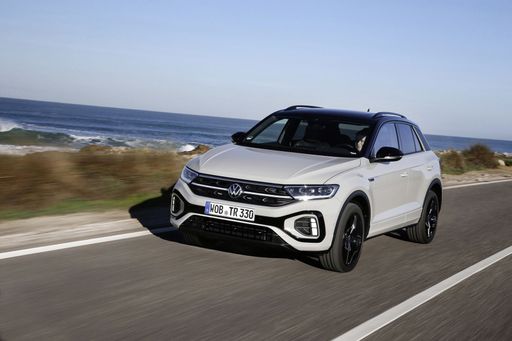
VW T-Roc
Kia Stonic
The Kia Stonic is a sprightly compact crossover that mixes city-friendly agility with a cheeky, modern design — perfect for buyers who want style without sacrificing sense. Inside it serves up clever practicality and a bright, well-equipped cabin, making everyday driving feel a bit more fun than it has any right to be.
details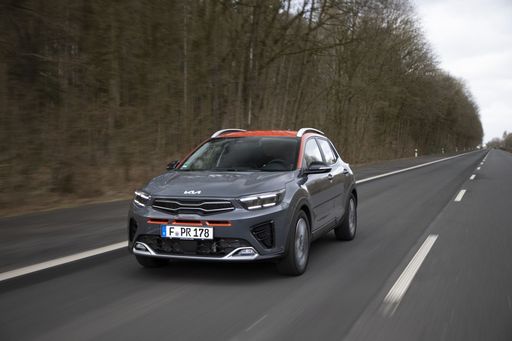
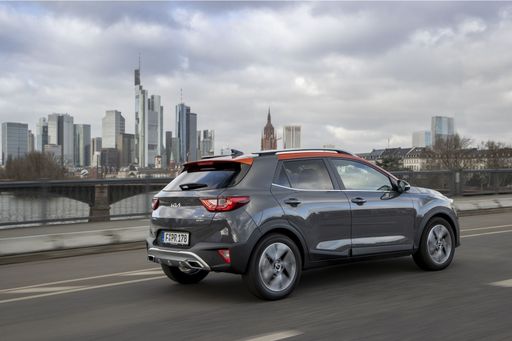
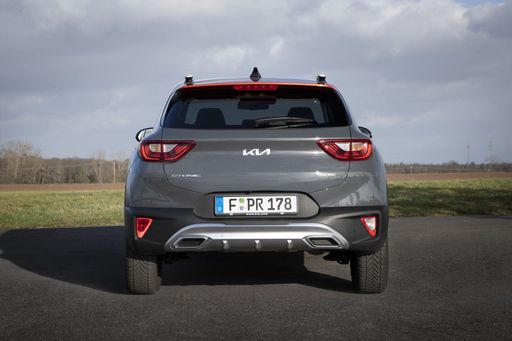
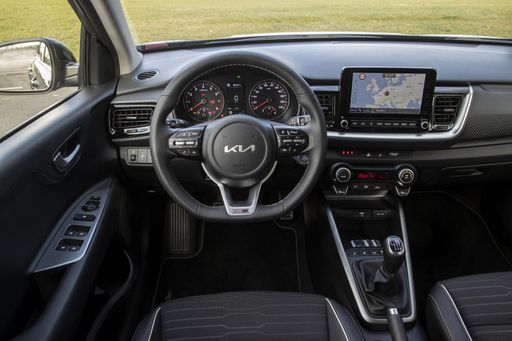
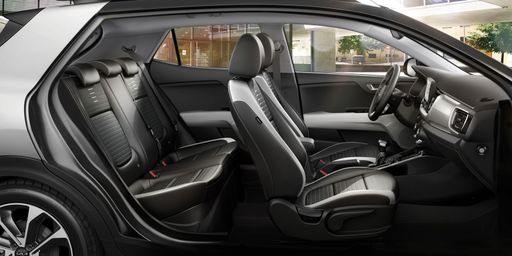
VW T-Roc
The VW T-Roc mixes cheeky, coupe-like styling with the everyday sense and space of an SUV, so it looks fun without sacrificing family sense. It’s a likeable all-rounder with tidy road manners and plenty of personality, ideal if you want a car that’s practical enough for chores but entertaining enough to enjoy.
details
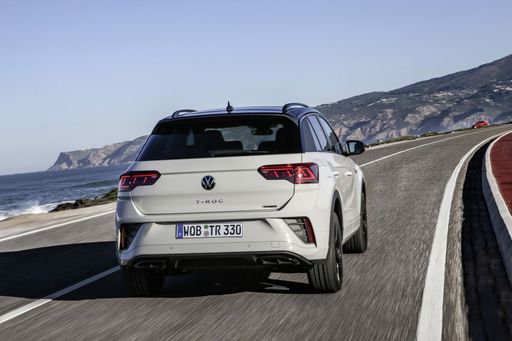
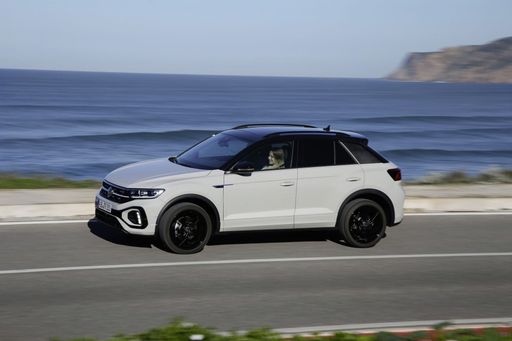
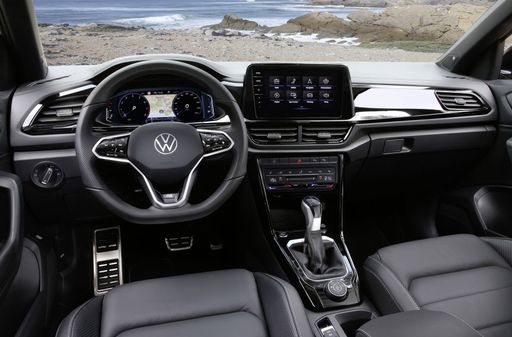
Costs and Consumption |
|
|---|---|
|
Price
20100 - 26600 £
|
Price
26400 - 38600 £
|
|
Consumption L/100km
5.6 - 5.9 L
|
Consumption L/100km
5.5 - 6.3 L
|
|
Consumption kWh/100km
-
|
Consumption kWh/100km
-
|
|
Electric Range
-
|
Electric Range
-
|
|
Battery Capacity
-
|
Battery Capacity
-
|
|
co2
127 - 133 g/km
|
co2
126 - 143 g/km
|
|
Fuel tank capacity
45 L
|
Fuel tank capacity
50 L
|
Dimensions and Body |
|
|---|---|
|
Body Type
SUV
|
Body Type
SUV
|
|
Seats
5
|
Seats
4 - 5
|
|
Doors
5
|
Doors
5
|
|
Curb weight
1205 - 1270 kg
|
Curb weight
1465 - 1539 kg
|
|
Trunk capacity
352 L
|
Trunk capacity
284 - 475 L
|
|
Length
4165 mm
|
Length
4373 mm
|
|
Width
1760 mm
|
Width
1811 - 1828 mm
|
|
Height
1520 mm
|
Height
1573 mm
|
|
Max trunk capacity
1155 L
|
Max trunk capacity
1350 L
|
|
Payload
440 - 445 kg
|
Payload
368 - 515 kg
|
Engine and Performance |
|
|---|---|
|
Engine Type
Petrol, Petrol MHEV
|
Engine Type
Petrol, Petrol MHEV
|
|
Transmission
Manuel, Automatic
|
Transmission
Manuel, Automatic
|
|
Transmission Detail
Manual Gearbox, Dual-Clutch Automatic
|
Transmission Detail
Manual Gearbox, Dual-Clutch Automatic
|
|
Drive Type
Front-Wheel Drive
|
Drive Type
Front-Wheel Drive
|
|
Power HP
100 - 115 HP
|
Power HP
115 - 150 HP
|
|
Acceleration 0-100km/h
10.7 - 12.1 s
|
Acceleration 0-100km/h
8.9 - 12.3 s
|
|
Max Speed
179 - 182 km/h
|
Max Speed
196 - 212 km/h
|
|
Torque
172 - 200 Nm
|
Torque
200 - 250 Nm
|
|
Number of Cylinders
3
|
Number of Cylinders
3 - 4
|
|
Power kW
74 - 85 kW
|
Power kW
85 - 110 kW
|
|
Engine capacity
998 cm3
|
Engine capacity
999 - 1498 cm3
|
General |
|
|---|---|
|
Model Year
2025
|
Model Year
2024 - 2025
|
|
CO2 Efficiency Class
D
|
CO2 Efficiency Class
E, D
|
|
Brand
Kia
|
Brand
VW
|
Is the Kia Stonic offered with different drivetrains?
The Kia Stonic is offered with Front-Wheel Drive.




